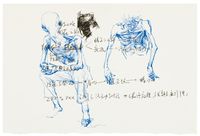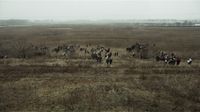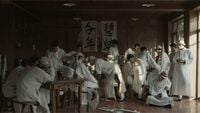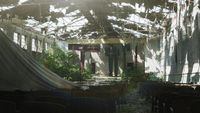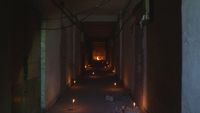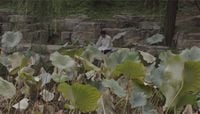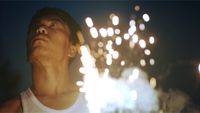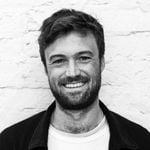Conceptual artist Wang Tuo produces video, performance, and mixed-media installations. Constructing mazes of intertwining melodramas and lived experience, they expose and question artificial concepts and ideologies rooted in cultural histories.
Read MoreBorn and raised in Changchun, China, Wang Tuo first studied biology at Northeast Normal University, Changchun. Turning to art, Wang Tuo completed an MA in Painting at Tsinghua University, Beijing in 2012, and then an MFA in Painting from Boston University, U.S.A. in 2014.
Wang Tuo's early interest was in performance art. Before leaving for America in 2012, the artist filmed himself and his father cutting each other's hair, before using the strands to make abstract works on canvas.
In early performances like A Portrait of the Artist as a Young Man Vol. 1 (2015), the artist self-referentially toys with the notion of performance. In the piece, he trains an 'outsider' to the art world to give a 'perfect' contemporary art performance, creating challenging scenarios for the audience.
In his current practice, Wang Tuo extends the notion of performance beyond expressing the physicality of the body. 'For me, performance is a kind of action,' he shared in an interview with Artforum, 'a process involving manipulation; the object or material of this manipulation might be the body, or an archive, an event, a person's experience or memory.'
In 2017, Wang Tuo returned to China, where he now lives and works in Beijing.
Film and mixed-media video installations form a significant part of Wang Tuo's practice. Each work is a labyrinth of individuals' lived experiences, scenes performed by actors, and interventions in archives of literature, film, theatre, art, and architecture. These play out in a visual collage of narration, sounds, and music over stills, animations, and video footage.
Prior to his return to Beijing, Wang Tuo exercised his performative manipulation in Role Play (2016). The short film explores the mythology of the white American middle class, in which two actors improvise the roles of a middle-class couple resolving a marriage dispute. Truth is blurred by the ambiguous relationship between contemporary reality and collective perception. Because the two actors have no lived experience of their given roles, they must act according to what previous acting and aspects of popular culture dictate.
In Smoke and Fire (2018), Wang Tuo similarly blurs truth by intertwining reality and fantasy. Comprising interwoven narratives, the 31-minute film presents a migrant worker from a small town in Northeast China straddling simultaneous realities. In one, he recites legendary tales out loud in a prop warehouse. In the other, his daily life, and journey back home to exact a violent revenge, are documented by the artist.
Architecture as a metaphor for the twisted mind has been a recurring motif in Wang Tuo's work. In Obsessions (2019), an architect is asked by his hypnotherapist to imagine his inner consciousness as a building. He narrates his monologue over a tour through the Fusuijing Mansions in Beijing's Xicheng District—a series of buildings, now half-abandoned, that once embodied socialist ideals of living.
Revisiting forgotten and suppressed histories is another running theme in Wang Tuo's work. The artist has previously stated, 'in my films, I try to talk about a lot of things that are not supposed to be seen or talked about.' Wang Tuo's non-linear film, Symptomatic Silence of Complicit Forgetting (2019) uses the narrative of a Red Guard, haunted by past actions, to explore the collective trauma of the cultural revolution and its legacies.
Wang Tuo's solo shows include Empty-handed into History, UCCA Center for Contemporary Art, Beijing (2021); Wang Tuo: Smoke and Fire, Present Company, New York (2019); Myths We Don't Outgrow, White Space Beijing (2017); The Monkey Grammarians, Salt Project, Beijing (2017); A Little Violence of Organized Forgetting, Taikang Space, Beijing (2016).
Wang Tuo's group shows include Psyche and Politics, Staatliche Kunsthalle Baden-Baden, Germany (2019); One Northeast, Zarya Center for Contemporary Art, Vladivostok, Russia (2018); New Metallurgists, Julia Stoschek Collection, Düsseldorf (2018); Nine, Queens Museum, New York (2017); The Real Thing, National Taiwan Museum of Fine Arts, Taichung (2015).
Wang Tuo's website can be found here.
Michael Irwin | Ocula | 2021
